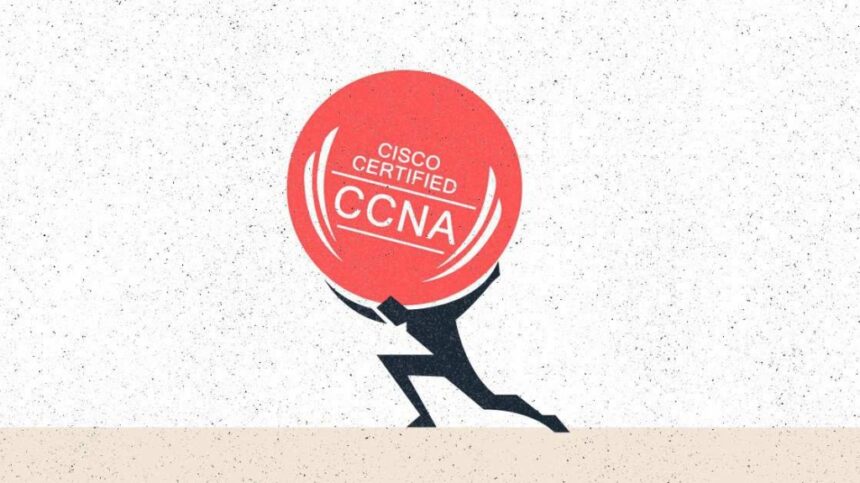The Cisco Certified Network Associate (CCNA) exam is a highly regarded certification in the world of networking. For those looking to break into IT and network administration, the CCNA is often considered one of the foundational certifications. But the question that many aspiring candidates ask is: Is CCNA difficult? The short answer is yes, it can be challenging. However, understanding what makes the CCNA exam so tough and how to prepare for it can significantly increase your chances of success.
In this article, we will explore the key factors that contribute to the difficulty of the CCNA exam, along with tips on how to conquer each of these challenges.
1. The Broad Scope of Topics Covered
One of the main reasons that people wonder, is CCNA hard is because of the vast range of topics it covers. The CCNA exam tests your knowledge of network fundamentals, routing and switching, security, and much more. The topics include:
- Network fundamentals (IP addressing, protocols, and types of networks)
- Routing and switching technologies (IPv4/IPv6, VLANs, and subnetting)
- Network security (ACLs, NAT, firewalls)
- Automation and programmability (SDN, REST APIs)
- WAN technologies (PPP, frame relay)
The wide variety of topics can make the CCNA exam and cost seem overwhelming. Many candidates feel they have to master concepts from different networking domains, which requires a significant investment of time and energy. This can be particularly challenging if you have little to no experience in networking.
2. The Complexity of Networking Concepts
Networking can be inherently difficult to grasp for some people. Many candidates find it challenging to understand the in-depth technical concepts of how networks function. A few key areas that often cause confusion include:
- Subnetting: Although subnetting is a critical skill in networking, it often frustrates candidates. The need to calculate network addresses, broadcast addresses, and usable host IPs can be overwhelming, especially for beginners.
- Routing Protocols: The exam covers various routing protocols like RIP, OSPF, and EIGRP, each with its own set of rules and algorithms. Understanding how these protocols choose the best path for data to travel can be complex.
- VLANs and Switching: Virtual Local Area Networks (VLANs) and Layer 2 switching technologies can also present difficulties. Configuring VLANs, trunking, and inter-VLAN routing requires an understanding of both the theory and hands-on implementation of these technologies.
Since networking is such a layered field, mastering these concepts often leads candidates to ask themselves: How hard is CCNA? The answer lies in the fact that it requires a solid understanding of both theory and practical application.
3. Hands-on Practice Requirements
The CCNA exam isn’t just about memorizing definitions or understanding theoretical concepts; it also requires hands-on practice. A common mistake candidates make is focusing only on theory, but without practical experience, passing the exam becomes difficult.
Cisco provides a variety of labs and simulations, but these are only useful if you’re prepared to dive into real-world network setups. Candidates who skip this crucial practice stage often struggle to pass the exam, especially when they encounter lab simulations during the test.
The demand for practical experience is one reason many ask, is CCNA difficult. Hands-on labs, along with live simulations on exam day, require candidates to configure routers and switches, troubleshoot issues, and ensure networks function as expected. This level of technical application can be intimidating if you don’t have the right resources or time to practice.
4. The Time Pressure During the Exam
Another challenge many candidates face is the time pressure of the CCNA exam. The exam is not only testing your knowledge but also your ability to work efficiently under time constraints. Candidates are given a limited amount of time to answer multiple-choice questions, configure network devices, and troubleshoot complex network scenarios.
This time pressure can be stressful, especially when you encounter tricky questions or complicated configurations that require additional time to solve. It’s essential to manage your time well during the exam and avoid spending too long on any single question.
5. The Exam Format: Multiple Choice and Simulations
The CCNA exam consists of multiple-choice questions, drag-and-drop items, and simulation-based questions that test your practical skills. Candidates must prepare for a wide variety of question formats, which can be mentally taxing if you’re not accustomed to working with these types of questions.
The simulation questions, in particular, can be intimidating. In these, you’re often asked to configure a network setup or troubleshoot a problem, which requires both knowledge and hands-on skills. While this practical element is an excellent way to assess real-world skills, it can also raise the stakes in terms of difficulty.
6. The Cost of Certification
The CCNA exam and cost can also be a barrier for many candidates. The exam typically costs around USD $300, which may seem steep, especially if you’re unsure whether you’ll pass. This price tag adds an extra layer of pressure on candidates, making it even more important to adequately prepare before attempting the exam.
Candidates often wonder whether the cost is worth it, especially if they’re unsure whether they can pass. However, given that the CCNA is a widely recognized certification that can open doors to better job opportunities and higher salaries, many find that the return on investment justifies the cost.
7. Consistency in Study and Preparation
Finally, the difficulty of passing the CCNA exam stems from the need for consistent study and dedication. It’s not a certification you can cram for a week before the exam. To succeed, you need to commit several months to focused study, practice, and hands-on labs.
Candidates who lack consistency in their preparation are more likely to struggle with the CCNA exam and cost, as they may not be fully prepared for all the questions and lab simulations. A structured study plan, combined with the use of reliable resources, will help you prepare effectively.
Conclusion: Can You Overcome the Challenges?
So, is CCNA hard? Yes, it is challenging, but with the right approach, it is definitely achievable. Understanding the topics covered, practicing hands-on skills, and dedicating time to consistent study are all key strategies for overcoming the difficulties of the CCNA exam.
While it’s true that how hard is CCNA depends on your individual background and experience, anyone can succeed with the right preparation. By addressing the complexities of the exam and using a variety of study resources, you can increase your chances of passing and earning this valuable certification.
click here to visit website







